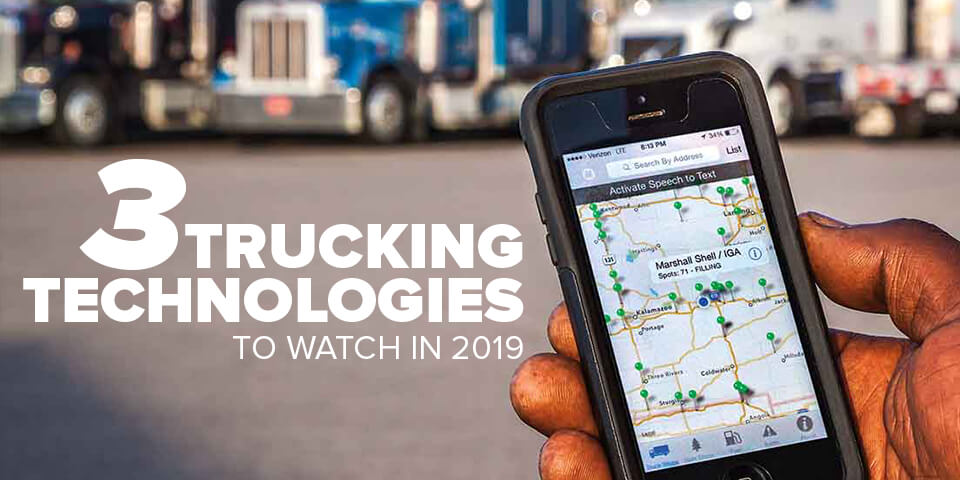In The News

3 New Trucking Technologies to Watch in 2019
While there has been a lot of media hype in recent years that robots will rule the roads, putting millions of truckers out of business, the reality is that Level 5, fully driverless trucks are still a long way out, according to most industry experts.
But significant developments are happening right now that directly impact the expedite business. And instead of a story of impending doom, these technologies offer the potential to improve safety, increase fuel efficiency, and make your job easier.
Here are three new technologies to keep your eye on this year.
#1. MirrorEye Camera Monitor System
https://www.stoneridge.com/
Imagine your truck had no side-view mirrors, but you could eliminate blind spots and improve fuel economy by up to 2.5 percent (by reducing aerodynamic drag caused by external mirrors).
That’s the idea behind the MirrorEye Camera Monitor System ("CMS") build by Stoneridge, Inc.
In January, Stonebridge announced that its exemption application was approved by the Federal Motor Carrier Safety Administration (FMCSA), allowing MirrorEye to be installed in place of conventional rear-vision mirrors currently required on commercial motor vehicles in the U.S.
MirrorEye provides three views, including wide angle, narrow-angle and passenger-side "look-down" to expand the driver's field of view and eliminate blind spots. It also offers trailer panning capabilities to track the end of the trailer, keeping it in view while the vehicle is moving forward, reducing the risk of right-hand turn collisions with motorists and pedestrians.
#2. 2020 Freightliner Cascadia with Detroit Assurance 5.0
https://freightliner.com/trucks/new-cascadia/
At the Consumer Electronics Show (CES) in January, Daimler Trucks North America (DTNA) introduced the first SAE Level 2 automated truck in series production in North America with Freightliner’s new 2020 Cascadia equipped with Detroit Assurance 5.0.
Level 2 automation means that the Cascadia's automated system can conduct some parts of the driving task—in this case, steering, acceleration, and braking—but the driver must still be fully engaged with monitoring the environment and performing the rest of the driving tasks.
The new Cascadia’s Detroit Assurance 5.0 consists of these automated driving capabilities:
- Adaptive Cruise Control to 0 mph: This is for driving in congested traffic conditions where repeated braking, accelerating and resetting of traditional cruise control can lead to driver fatigue.
- Active Lane Assist: When Adaptive Cruise Control is enabled, Lane Keep Assist automatically makes micro-steering movements to keep the truck centered in its lane. With Lane Departure Protection, if the truck begins to drift without the turn signal engaged, the system will counter-steer the truck back into its lane with both an auditory and visual warning.
- Active Brake Assist 5.0: The combined camera and radar technology detects moving pedestrians and cyclists and stationary vehicles and objects in front of the truck and can deploy full braking when necessary.
- Side Guard Assist: The system detects objects, including pedestrians and cyclists, in the passenger-side blind spot for the tractor and a full-length 53-foot trailer, alerting the driver with an audible and visual warning.
But if you're a driver for a fleet owner in the new Cascadia, don't think you can get away with hands-free driving for extended periods. That's because Detroit Connect Analytics provides fleets with analysis and critical insights on the performance of the new Detroit Assurance 5.0 safety features—and that includes notifying fleets when drivers have their hands off the wheel for longer than 60 seconds.
#3. Truck Parking Information Management Systems
https://trucksparkhere.com/
It can get stressful trying to find a safe and legal place to park your truck when your hours are running out.
But in January, new technology rolled out in 8 Midwestern states—Indiana, Iowa, Kansas, Kentucky, Michigan, Minnesota, Ohio, and Wisconsin—to help make finding parking much easier and less stressful.
Dubbed "The Trucks Park Here," this truck parking information management system (TPIMS) gives drivers access to real-time parking availability through websites, highway signs, and smartphone apps.
This way, you can spend less time looking for parking and more time on more productive tasks.
For a list of apps and websites that provide real-time parking information, see https://trucksparkhere.com/find-parking/.
